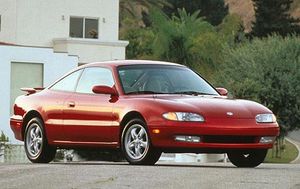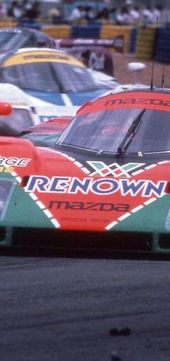.
Mazda MX-6: Difference between revisions
No edit summary |
No edit summary |
||
| Line 21: | Line 21: | ||
The MX-6 was mechanically identical to the [[Ford Probe]]. Both cars shared the [[Mazda GD platform]] (1988-1992) and GE platform (1993-1997). Along with the Ford Probe, the Mazda MX-6 was designed and built in America in a joint venture with [[Ford Motor Company|Ford]], called [[Auto Alliance]]. | The MX-6 was mechanically identical to the [[Ford Probe]]. Both cars shared the [[Mazda GD platform]] (1988-1992) and GE platform (1993-1997). Along with the Ford Probe, the Mazda MX-6 was designed and built in America in a joint venture with [[Ford Motor Company|Ford]], called [[Auto Alliance]]. | ||
See Wikicars' comprehensive '''[[ | See Wikicars' comprehensive '''[[Mazda MX-6 Review]]'''. | ||
===Recent Changes=== | ===Recent Changes=== | ||
Revision as of 07:06, 27 June 2009

| |
| Mazda MX-6 | |
|---|---|
| Mazda | |
| aka | Type aka here, not up there |
| Production | 1988-1997 |
| Class | Mid-size Sports |
| Body Style | 2 dr Coupe |
| Length | length - type here |
| Width | Width - type here |
| Height | Height - type here |
| Wheelbase | wheelbase - type here |
| Weight | Weight - you get the point |
| Transmission | 5 speed Manual 4 speed Automatic, FWD |
| Engine | 2.5L V6 24 valve DOHC |
| Power | 157.3 hp @ 5600 rpm 175.2 lb-ft of torque @ 4800 rpm |
| Similar | Honda Prelude |
| Designer | Designer (lead designer if it was a team effort) |
The Mazda MX-6 was a front-wheel drive sporty coupe produced by Mazda between 1988 and 1997 to compete with the likes of the Chevrolet Beretta, Toyota Celica, Nissan 240SX and Honda Prelude.
The MX-6 was mechanically identical to the Ford Probe. Both cars shared the Mazda GD platform (1988-1992) and GE platform (1993-1997). Along with the Ford Probe, the Mazda MX-6 was designed and built in America in a joint venture with Ford, called Auto Alliance.
See Wikicars' comprehensive Mazda MX-6 Review.
Recent Changes
Mention any minor facelifts or major changes made to the vehicle here.
Styles and Major Options
| Year | Model | Engine | Power | Torque | 0–60 mph (97 km/h) | .25 mi (0.4 km) | Top speed |
|---|---|---|---|---|---|---|---|
| 1988–1992 | DT, LX, LE | 2.2 L (2184 cc) F2 I4 | 110 hp (82 kW) | 130 ft·lbf (176 N·m) | |||
| 1988–1992 | GT | 2.2 L (2184 cc) F2T turbo I4 | 145 hp (108 kW) | 190 ft·lbf (258 N·m) | |||
| 1993–1997 | RS | 2.0 L (1991 cc) FS I4 | 118 hp (88 kW) | 127 ft·lbf (172 N·m) | |||
| 1993–1997 | LS | 2.5 L (2497 cc) KL-DE V6 | 164 hp (122 kW) at 5600 rpm | 156 ft·lbf (212 N·m) at 4000 rpm | 7.2 | 15.6 at 88 mph (142 km/h) | 129 mph (208 km/h) |
Pricing
Add more fields as necessary.
| MODEL Trims | |||
|---|---|---|---|
| Trim1 | Trim2 | Trim3 | Trim4 |
| MSRP | |||
| $Price1 | $Price2 | $Price3 | $Price4 |
| Invoice | |||
| $Price1 | $Price2 | $Price3 | $Price4 |
Gas Mileage
Add more fields as necessary.
As seen on the FuelEconomy.gov website, the City/Highway MPG averages are as follows:
| Trim | |||
|---|---|---|---|
| Trim1 | Trim2 | Trim3 | Trim4 |
| MPG | |||
| c/h | c/h | c/h | c/h |
Engine and Transmission
Specifications, details, graphs, pictures and other information regarding the powertrain is placed in this section.
Performance
Please make sure to write information of the vehicle's performance in a third-person point of view. This section should include information about the car's acceleration figures, handling, braking, etc.
If using information gathered from Road Test articles from a reputable automotive source, then please make sure to cite the quote.
Reliability
Warranty options and scheduled maintainence information should be mentioned here.
The most common problem reported in MX-6s is the air intake tube where the bypass air control valve could occasionally be faulty.
Safety
This section should reference points on safety ratings and features of the vehicle.
Photos
Add Photos of the vehicle here.
Please make sure not to use copyrighted photos.
Colors
- Red
- Burgundy
- White
- Dynamic Silver
- Dark Navy Blue
- Noble Green
Main Competitors
Hybrid Models
If there are hybrid versions of this vehicle manufactured, then please elaborate a little bit on it here.
Unique Attributes
If there are any features of this vehicle that sets it apart from other vehicles in its class, then mention those unique attributes here.
Interior
This section should include information on the interior's design, build quality, ergonomics, space (head and legroom, front and rear), features, stowage compartments and overall comfortability and livability. Add pictures wherever applicable and keep information in a third-person point of view.
Resale Values
Add more fields as necessary.
| <MODEL> Year | |||
|---|---|---|---|
| Year X | Year X-2 | Year X-3 | Year X-4 |
| Resale Value | |||
| $ | $ | $ | $ |
Criticisms
Please make sure to keep critiques in a third-person point of view. If using criticisms from a reputable automotive source, then please make sure to cite the quote.
Generations
Fill in as many as appropriate. Add more if necessary and pictures wherever applicable.
Please make sure NOT to use copyrighted pictures.
Second generation (1993-1997)
The second-generation car came out in the United States in late 1992 as a 1993 model. It used Mazda's GE platform, which it shared with the 626 and the Ford Probe. In Canada, the car was known as the MX-6 Mystére. The MX-6 came with Mazda-designed engines and was available in two trims:
- The RS or base version came with a 2.0 L FS inline 4 producing 118 hp (88 kW)
- The LS version came with a 2.5 L KL V6 producing 164 to 170 hp (122 to 127 kW), depending on the year.
In Japan, the 2.5 L V6 was the higher performance KLZE, while the 2.0 L was a I4 called the FS. In Europe and America, the 2.5 L V6 was a lower performance KL03. In Australia and Japan, four wheel steering was an option. In Australia, this E-spec mx6, (built in Japan for the Australian and European markets) was released to the Australian market in December 1991, as the GE10L1 model, which ran until August 1994, when the GE20L2 model was released, with different wheels and interior trim. This model lasted until the MX-6 finished in June 1997.
First Generation/Origins (1988-1992)
The first generation MX-6/Probe appeared in 1988 and lasted until 1992 in the United States. In some markets the model years were from 1987 to 1991. It was based on a series of futuristic concept cars of the early 1980s. It was a large coupe, based on the Mazda GD platform, and was powered by a 2.2 L SOHC I4 cylinder Mazda F2 engine. The base engine produced just 110 hp (82 kW), but a 145 hp (108 kW) turbocharged version was available.
This generation was available in several trim levels, which differ depending on the market the vehicle was sold in. In the United States, the MX-6 was available in DX, LX, LE, and GT trim levels:
- DX was the "bare bones" model, offering the base 110 hp/130 ft.lbf F2 2.2 L engine and few options, but most MX-6s sold in the U.S. were equipped with air conditioning.
- LX added power windows, power locks, and power mirrors, as well as an optional electric moonroof.
- LE was a rare "Leather Edition" model that the same as the LX and included leather seating surfaces and a leather wrapped shift knob on manual transmission-equipped vehicles.
- GT included all options from the LX, but also stepped up to the F2T 2.2L turbocharged, intercooled engine, which put out 145 hp and 190 ft.lbf of torque delivering a significant performance boost. It also had 4 wheel disc brakes with ABS and 3 way adjustable suspension.
In 1989, Mazda offered a special four wheel steering (commonly abbrieviated 4WS) option on MX-6 GTs destined for the U.S. This system consisted of an electronically controlled rear steering rack that turned the rear wheels opposite to the fronts at low speeds to improve cornering, and turned the rear wheels with the fronts at high speeds to improve highway lane change manuvering.
European and Asian spec vehicles commonly received either the 1.8 L SOHC or 2.0 L SOHC FE engine in GLX models, or the 2.0 L DOHC FE engine (sometimes called FE3) in their GT models. 4WS was a common option for European MX-6s. Australian vehicles were almost always equipped with same the 2.2 L turbocharged F2 motor as the U.S., as well as 4WS.
Worldwide
If the vehicle is sold in other markets worldwide, then this is the section to mention that information. Also, mention if the <MODEL> goes by another name in these other markets.
Design quirks and oddities
Refer to any pop-culture tidbits about the vehicle in this section.
Awards
List out notable awards that the model has recieved while in production. Boldface the company or organization that gives out the award, and Italicize the name of the award.
See Also
References
- Patrick Bedard. "Mazda MX-6 LS". Car and Driver (August 1992): 55–59.
- Mazda Australia 4WS explanation and history

